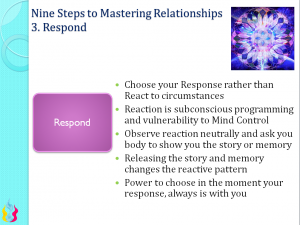Respond: Difference between revisions
No edit summary |
No edit summary |
||
| Line 1: | Line 1: | ||
[[File:Respond.png|thumb|Respond]] | [[File:Respond.png|thumb|Respond]] | ||
[[Respond ]]– In the moment, learn how to choose your response rather than react to life events, people and circumstances. Reaction is [[Unconscious Mind|subconscious programming]] and mostly operated from preconceived ideas, fear or mind control. Observe your reaction and ask your body to show you the story or memory behind the reaction. As one learns to inquire about the reactions you generate , much is learned about your body [[Consciousness]] and can effectively be healed and cleared from continuing the reaction. Emotional catharsis techniques ( [[ES Core Triad]] Practice includes them) help to release the story from the body so it can return to a new pattern free of the reactive pain. Choosing forgiveness, kindness, [[Compassion]] and self-love, is all a decision one has the power to make in every moment, by choosing your response to self and others. | |||
[[ | ==Relationship Mastery Guideline== | ||
[[Relationship Mastery Guidelines]] is has nine basic steps and is a [[Service to Others]] method based in the [[Law of One]] and cultivating [[GSF Behavior]], while reaping the mutual energetic benefits of experiencing more spiritual connection, and increased love and appreciation returning back from others to you. | |||
Improving our [[Compassion]]ate communication with others, improving our relating skills, personally and in group dynamics, is a skill set that will go a long way to serve your mission. With that in mind we set forth a few guidelines to remember when communicating with others or relating with others. The third step is learning how to [[Respond]] over reaction through controlling our impulsive reactions and behaviors. | |||
Revision as of 01:41, 22 August 2014
Respond – In the moment, learn how to choose your response rather than react to life events, people and circumstances. Reaction is subconscious programming and mostly operated from preconceived ideas, fear or mind control. Observe your reaction and ask your body to show you the story or memory behind the reaction. As one learns to inquire about the reactions you generate , much is learned about your body Consciousness and can effectively be healed and cleared from continuing the reaction. Emotional catharsis techniques ( ES Core Triad Practice includes them) help to release the story from the body so it can return to a new pattern free of the reactive pain. Choosing forgiveness, kindness, Compassion and self-love, is all a decision one has the power to make in every moment, by choosing your response to self and others.
Relationship Mastery Guideline
Relationship Mastery Guidelines is has nine basic steps and is a Service to Others method based in the Law of One and cultivating GSF Behavior, while reaping the mutual energetic benefits of experiencing more spiritual connection, and increased love and appreciation returning back from others to you.
Improving our Compassionate communication with others, improving our relating skills, personally and in group dynamics, is a skill set that will go a long way to serve your mission. With that in mind we set forth a few guidelines to remember when communicating with others or relating with others. The third step is learning how to Respond over reaction through controlling our impulsive reactions and behaviors.


